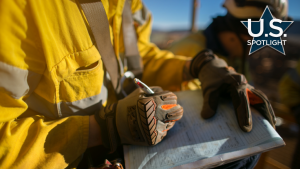Construction employers watching a recent League of Champions webinar were warned that the best-laid protocols to stop the spread of COVID-19 on jobsites will only be effective if they are complemented by well-developed plans to ensure workers are psychologically fit to work in the new work environments.
Alberici Constructors director of safety and quality Robert Love delivered a sobering message to the contractors and others online during the May 21 event.
There has already been an uptick — albeit slight — in the number of near-miss safety events on jobsites due to the distractions and revamped workflow associated with the virus.
“With such a huge emphasis being placed on physical distancing, what we found is it is easy to get out of a project’s typical rhythms,” Love said.
This is not surprising given the increased number of stressors managers and tradespeople are going through, he pointed out. Workers might have been off for months and might not yet be back in the flow, he said, and there have significant changes to work safety protocols to remember.
The near-misses have been relating to planning, body positioning and line of fire, and situational awareness, Love said.
“What we tried to do is come up with some creative ways to get back into that flow and I encourage everyone to give consideration to that when you start mobilizing,” he remarked. “We put so much energy into making sure our sites are physically ready, but there is a lot of co-ordination-type people interactions that sometimes get forgotten.”
As part of preparing its managers, supervisors and workers for a return to worksites, Alberici used human resources tools in place before the pandemic hit and adapted them to the new realities, Love said.
It is really important to make sure you are prepared mentally for this return
— Robert Love
Alberici Constructors
Workers are asked to assess unsatisfactory projects they have experienced in the past and determine why the project went off the rails — what they found personally demotivating.
Answers typically are poor planning and communication, leading to scrambling to get work done; feeling excluded from the project; disrespectful treatment; absentee supervision; improper tools and equipment; and dirty work environments.
Each of these complaints has relevance to the new COVID-19-era workplace, Love said.
Responses by health and safety managers could include ensuring more open dialogue, support and orientation as workers learn to negotiate the new normal; taking steps to arrange for adequate facilities, tools and equipment; and following up with proper observation and inspection.
Make sure the new human resources plan is not just words on a page, Love stressed — it’s got to be put into operation.
“Establish a communication plan and dedicated points of contact to make sure the message is consistent and clear,” he said, adding during the implementation period managers should “lean on” health and safety reps and the joint health and safety committee as assets.
What will become clear as workers return to the site, Love said, is that there will be differing attitudes towards new COVID-19 protocols. Some workers will want to be vigilant in following new distancing and other rules while others will be more cavalier.
Employers should accept both levels of anxiety and keep communicating in both directions to reconcile the differences, Love said.
“This is a very unique crisis, so who are we to tell others how they should be feeling about this,” he remarked.
For managers, as the workers get back into familiar work but in unfamiliar circumstances, there should be extra vigilance and attention as the new responsibilities are communicated and enforced.
“During this transition period, don’t underestimate the importance of boots on the ground,” observation and coaching, said Love.
The stepped-up communication will include regular checking to ensure everyone understands why new protocols are in place and to also ensure they are workable, and there should also be heightened concern to ensure that workers’ mental health is monitored.
Now is not the time for supervisors to sit back in their trailers, said Love.
“It is really important to make sure you are prepared mentally for this return,” he said. “And by this I mean ensure we have a mindset that is rooted in effective planning, open communication and active observation.”
Follow the author on Twitter @DonWall_DCN.











Recent Comments
comments for this post are closed